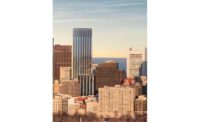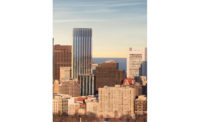Just when it seemed like a 20-year-old state law restricting shadows cast by tall buildings on the Boston Common and the Public Garden was going to be relaxed, state lawmakers hit the pause button.
Before a public hearing on the measure that would pave the way for a proposed 775-ft-tall skyscraper called Winthrop Square, state and city officials reached a tentative agreement that would allow developer Millennium Partners to build the billion-dollar tower on the site of a defunct city parking garage. The deal would reportedly help fund the 7-acre Rose Fitzgerald Kennedy Greenway, which abuts the proposed tower and is on state-owned land created by the Big Dig. The deal, which would require approvals from several oversight boards, would earmark $5 million to maintain the Greenway from the $153 million Millennium Partners is paying for the city-owned parcel.
But during the June 27 public hearing, Massachusetts Secretary of State William Galvin—who oversees the Massachusetts Historic Commission—asked state lawmakers for a two-week delay on the vote so the Commission can study the legislation, and they agreed.
In a letter to the chairmen of the committee considering the bill, Galvin wrote, “This significant legislation would repeal existing statutory protections for some of our most historic buildings and parklands.”
After his office only obtained access to the developer’s shadow study four days before the hearing on June 23, Galvin wrote, “clearly not an adequate time to make a thorough, professional review.”
He went on to write, “It is worth noting that even a cursory review makes it clear that there are many approximations and disclaimers in the study. I believe we owe it to the people of Massachusetts to be diligent in seeking an independent review of these important questions, therefore my request for no action at this time.”
While the bill would allow Winthrop Square to cast previously unlawful shadows, it would prohibit shadows cast by future tall buildings on the Common and Public Garden. It would also strengthen regulations on casting shadows on Copley Square.
Before the legislation was sent to state lawmakers on Beacon Hill, it was a home rule petition drafted by Boston Mayor Martin Walsh and approved by the Boston City Council in April.
According to the petition, the city is poised to collect $12 million in annual tax payments from the deal and will benefit from a neighborhood housing and jobs trusts. The deal also includes building affordable housing units in Chinatown, public realm improvements in Boston’s financial district and thousands of new construction and permanent jobs.
If passed by the state Legislature, the bill would need to be signed by Gov. Charlie Baker (R).






Post a comment to this article
Report Abusive Comment